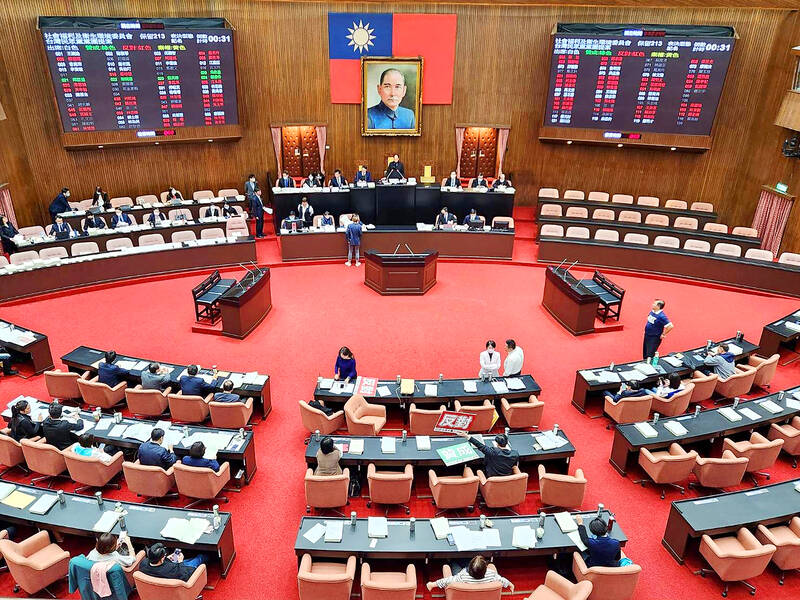The Chinese Nationalist Party (KMT) yesterday vowed to enhance the functions of the legislature by asking the president to give a “State of the Nation” address before lawmakers.
The party issued a statement ahead of the legislative speaker’s election on Feb. 1 after the Taiwan People’s Party (TPP) on Monday laid out its principles for choosing a legislative speaker.
In Saturday’s legislative elections, the DPP secured 51 seats in the 113-seat legislature, the KMT garnered 52 and the TPP won eight. Another two seats were won by independents aligned with the KMT.

Photo: Taipei Times
The KMT yesterday said its national policy priority for the incoming legislature would be based on a joint statement it made with the TPP on Oct. 30 last year, in which they agreed to cooperate.
“We will not deviate from the visions we presented in our meeting with the TPP last year. We will focus on exposing scandals in the DPP government’s procurement of COVID-19 vaccines produced by Medigen Vaccine Biologics Corp (高端疫苗) and reviewing bills to protect whistle-blowers. We will also follow the direction of public opinion, stand with the people and oversee the government,” the KMT said.
“We will follow our own path and invite those who share our political convictions to join us. This would prevent democratically elected leaders from governing the nation in a monolithic manner,” it added.
In the joint statement last year, the KMT and TPP pledged to jointly conduct a new wave of legislative reforms to avoid winner-takes-all democratic tyranny.
Among their agreements at the time the two parties had stated that the legislative functions under the framework laid down by the Constitution should be enhanced by asking the president to deliver a “State of the Nation” address before lawmakers.
The president should provide a supplementary report after hearing recommendations from different legislative caucuses, they said.
The appointment of the premier should be supported by the majority of lawmakers, and ministry officials should attend administrative hearings organized by lawmakers, they added.
Separately yesterday, Pan Men-an (潘孟安), the manager of Vice President William Lai’s (賴清德) election campaign, said that former presidents Chen Shui-bian (陳水扁) and Ma Ying-jeou (馬英九) were willing to give a “State of the Nation” address in the legislature, but neither was able to because party caucuses would have to negotiate over the details of such a request.
“Lai would not avoid such a request from the legislature,” Pan said.
Lai himself said during the presidential debate that the president is obligated to give a “State of the Nation” address and accept inquiries from lawmakers based on the Constitution and the Act Governing the Legislative Yuan’s Power (立法院職權行使法).
However, it is not the same as a question-and-answer session, he said.
Additional reporting by Chen Yun

AT RISK: The council reiterated that people should seriously consider the necessity of visiting China, after Beijing passed 22 guidelines to punish ‘die-hard’ separatists The Mainland Affairs Council (MAC) has since Jan. 1 last year received 65 petitions regarding Taiwanese who were interrogated or detained in China, MAC Minister Chiu Chui-cheng (邱垂正) said yesterday. Fifty-two either went missing or had their personal freedoms restricted, with some put in criminal detention, while 13 were interrogated and temporarily detained, he said in a radio interview. On June 21 last year, China announced 22 guidelines to punish “die-hard Taiwanese independence separatists,” allowing Chinese courts to try people in absentia. The guidelines are uncivilized and inhumane, allowing Beijing to seize assets and issue the death penalty, with no regard for potential

STILL COMMITTED: The US opposes any forced change to the ‘status quo’ in the Strait, but also does not seek conflict, US Secretary of State Marco Rubio said US President Donald Trump’s administration released US$5.3 billion in previously frozen foreign aid, including US$870 million in security exemptions for programs in Taiwan, a list of exemptions reviewed by Reuters showed. Trump ordered a 90-day pause on foreign aid shortly after taking office on Jan. 20, halting funding for everything from programs that fight starvation and deadly diseases to providing shelters for millions of displaced people across the globe. US Secretary of State Marco Rubio, who has said that all foreign assistance must align with Trump’s “America First” priorities, issued waivers late last month on military aid to Israel and Egypt, the

‘UNITED FRONT’ FRONTS: Barring contact with Huaqiao and Jinan universities is needed to stop China targeting Taiwanese students, the education minister said Taiwan has blacklisted two Chinese universities from conducting academic exchange programs in the nation after reports that the institutes are arms of Beijing’s United Front Work Department, Minister of Education Cheng Ying-yao (鄭英耀) said in an exclusive interview with the Chinese-language Liberty Times (the Taipei Times’ sister paper) published yesterday. China’s Huaqiao University in Xiamen and Quanzhou, as well as Jinan University in Guangzhou, which have 600 and 1,500 Taiwanese on their rolls respectively, are under direct control of the Chinese government’s political warfare branch, Cheng said, citing reports by national security officials. A comprehensive ban on Taiwanese institutions collaborating or

France’s nuclear-powered aircraft carrier and accompanying warships were in the Philippines yesterday after holding combat drills with Philippine forces in the disputed South China Sea in a show of firepower that would likely antagonize China. The Charles de Gaulle on Friday docked at Subic Bay, a former US naval base northwest of Manila, for a break after more than two months of deployment in the Indo-Pacific region. The French carrier engaged with security allies for contingency readiness and to promote regional security, including with Philippine forces, navy ships and fighter jets. They held anti-submarine warfare drills and aerial combat training on Friday in